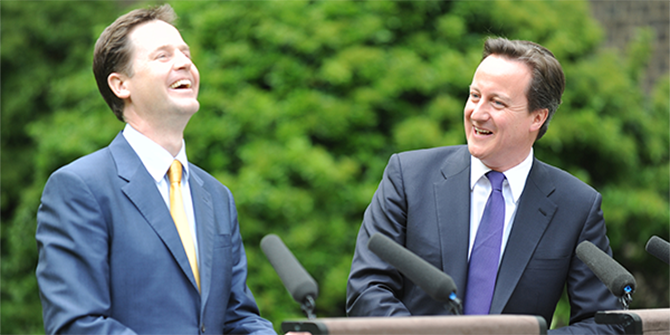 Using the governance of police as a case-study, Ron Amann argues that many aspects of the overall mode of political and managerial control in our society are disturbingly familiar with that of the Soviet Union.
Using the governance of police as a case-study, Ron Amann argues that many aspects of the overall mode of political and managerial control in our society are disturbingly familiar with that of the Soviet Union.
As a former student of centrally planned economies I have been astonished by the emergence during the last 25 years or so of a political and administrative landscape in Britain that has much in common with that of the former Soviet Union. These similarities, which are by no means confined to the public sector, can be summarized as follows:
- The proliferation of targets, ephemeral initiatives and contrived visions.
- The catechetical internalization of values and constrained use of language – reinforced by the interventions of external management consultancies and training agencies (the professional Agitprop functionaries of our age).
- The accumulation of a distinctive form of intellectual capital based on the capacity to manage the vast amount of detail required by a target-based culture, and to ‘negotiate’ effectively within its parameters (similar in many ways to survival skills honed by Soviet enterprise managers).
- The crystallization of powerful institutional self-interests in preserving the status quo, not only on the part of those playing a direct managerial role at all levels but also among a wide range of organizations providing services.
- The eventual formation of an aggregate mode of control that becomes bigger than any of the individual players (including, even, senior political leaders), is largely unchallenged by mainstream opinion and is impervious to critique by marginalized minorities. In Marcuse’s phrase, it comes to be seen as part of “the objective order of things”.
Obviously, there are important contextual differences between contemporary Britain and the former Soviet Union; for example, in terms of the ownership of productive assets, configuration of social classes and associated ideologies. But many aspects of the overall mode of political and managerial control are disturbingly familiar – not least in a prevailing ideological narrative that represents this form of managerialism as a source of individual empowerment (when the hearts and everyday experience of those who are exposed to it in schools, hospitals, universities, local government and elsewhere clearly tell them otherwise, and who find it soul-destroying to have their professional autonomy and judgement so systematically squeezed). In Milovan Djilas’s memorable phrase, these are the “vampire ideas” that linger on after death to suck the blood of later generations. All this has given rise to a huge amount of private grumbling, a certain amount of refreshing satire and black humour (which is, of course, characteristic of totalitarian regimes!) but relatively little public theorizing on the scale required.
At the beginning of the 1990s I ceased to be a full-time academic researcher and took up a succession of fairly senior roles in the UK public sector which allowed me to observe, as an active participant, some major aspects of how this emerging political class in Britain operates. Without having had the benefit of any professional training in social anthropology (which I have come to believe is a key academic discipline for understanding all this) I have tried my best to get to the roots of the issues, and have written down my thoughts in a series of articles in the Political Quarterly.
It was as a university Pro-Vice-Chancellor and, subsequently, Head of the ESRC, that I first encountered at close quarters the target driven culture that was growing in Britain, and became personally acquainted with members of the various tribes that made up its political class. Why was all this happening I asked myself? I took a first stab at answering this question in Political Quarterly in an article entitled “A Sovietological View of Modern Britain”. Charting the many observable similarities between what was currently going on in Britain and what had been the case in the former Soviet Union, my main argument was that the impulse for elaborate targeting and central control in the two countries, not unexpectedly, came from two diametrically opposite directions. In Russia, the growth of the system of central planning had been the culmination of a longstanding intellectual debate about “economism” and the role of the Party in the state, the upshot of which was the perceived need to impose a “social interest” from the centre by means of precisely defined priorities and an elaborate system of physical controls over resources. In Britain, by contrast, the drive stemmed, paradoxically, from the decision to create quasi-markets across a wide range of public services. From these acorns grew the great oak tree of the “New Public Management”, entailing a range of costs and consequences that went way beyond the light touch regulation that had been anticipated.
Subsequently, as a Permanent Secretary in the Cabinet Office, I had an opportunity to observe over a three year period how policy agendas were set at the heart of government as the result of an intensely competitive internal process of attention seeking and “delivery”, driven forward by discrete policy “champions” and their respective teams. It was a process that tended to give greater weight to maintaining political visibility and judging how initiatives were likely to play with the electorate, and correspondingly less weight to careful assessments of implementation, specific local relevance and realism on the ground – considerations that are perhaps associated with the more traditional virtues of the British Civil Service. I wrote this up as an article entitled “The Circumlocution Office” in the Political Quarterly.
The general implications for a country of an administrative culture and mode of governance of the kind I have described above are potentially far-reaching. In ascending order of importance, the costs and consequences may be summed up as follows:
- Direct costs (primarily in paying the salaries of the aggregate annual cohorts of some of Britain’s brightest graduates, who have been successively drawn into the system over a long period time and who now constitute a critical mass of managerial leadership).
- Compliance costs which are imposed on others (in terms of excessive paperwork, nugatory actions and a wide range of ‘displacement’ activities that often miss the main point).
- Conceptual costs (which arise from the way in which policy objectives are deliberately framed and defined in order for them to be conveniently managed and achieved). Crude measurable targets are “crunchy”; reflection, consideration of ambiguity and intellectual depth are seen as “too difficult” and inimical to “delivery”. The opportunity cost of conceptual and scientific weakness is to be found in policy unreality and outright error.
What is now needed, in my opinion, is a national research programme which looks critically at how a broad sample of major public public service providers in Britain actually operate, and does so with the independence and intellectual depth demonstrated, for example, by Heclo and Wildavsky almost 40 years ago in their classic study of the UK Treasury (The Private Government of Public Money). All that I can personally contribute at present is one fragment of that overall picture based on my recent experience over a four year period as the Lead Member for Serious and Organized Crime on West Midlands Police Authority, the second largest police force in Britain. From a bottom-up perspective this gave me some detailed empirical insights into the complex social and political environment in which the police have to operate. My most recent article, “On the Receiving End”, which is largely based on this experience, can be found in the latest issue of the Political Quarterly.
The complex games-playing environment in which senior police officers (and, by implication, members of the Police Authority) find themselves means that they are constantly having to navigate their way through potentially treacherous cross currents and whirlpools. This specific case-study, therefore, offers an illuminating example of how the new managerialist class in all its various manifestations can impact upon professionals working at the sharp end. (The parallels with the situation of former Soviet enterprise directors are at times almost too painful to contemplate!). The particular aspects that I chose to concentrate on in my article are:
- The insecure funding platform, entailing mythical allocation criteria and frequently moving goalposts.
- The fraught management of community tensions by means of re-assurance rather than more honest engagement, as a result of complex political pressures.
- The extraordinarily slippery concept of “proportionality” and how it has shaped targets, presentation of data and debates about ‘grooming’ and ‘stop and search’.
- Sensitive nationally funded projects that go wrong (in counter terrorism, for example) where the centre unobtrusively runs for cover and the Police Authority, by virtue of its formal governance role, can be left holding the baby.
- An elaborate Performance Framework for assessing Police Authorities, which contained an impressive array of abstract boxes, while failing to probe what Members’ substantive knowledge of the real business of policing actually was.
Police Authorities in Britain came to an end in November 2012, to be replaced by a new system of elected Police Commissioners. And here lies the final irony in the story. The old Police Authorities were by no means perfect, and one might have expected that such a major policy change would have entailed a rigorous empirical analysis of what the “real business” of policing actually is, the strengths and weaknesses that Authorities had demonstrated in relation to providing oversight of this core business, and the specific ways in which the proposed Commissioners could be expected to add value. Instead, this major policy change, about which the general public had serious misgivings, was “framed” almost entirely in terms of superficial “visibility” rather than specific “competence” – an outcome which, alas, is utterly consistent with the central argument of this piece.
Note: This article gives the views of the author, and not the position of the British Politics and Policy blog, nor of the London School of Economics. Please read our comments policy before posting.
Ron Amann was a Professor of Comparative Politics at the University of Birmingham during the first part of his career, specialising in the Political Economy of Russia and Eastern Europe. Following a spell as Pro-Vice-Chancellor of the university he moved on to become Head of there ESRC and, subsequently, a Permanent Secretary in the Cabinet Office. In 2012 he came to the end of a four year tenure as committee Chair for Serious and Organised Crime on West Midlands Police Authority.








5 Comments